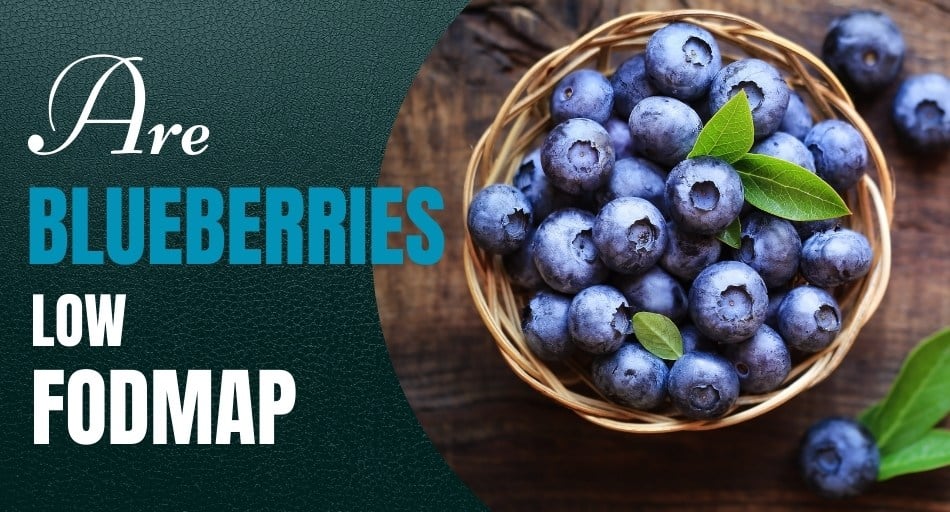Sticking to a low FODMAP diet can be a very difficult venture. After all, most foods contain these indigestible carbs, at least in small quantities.

So, it might be hard to figure out which foods are safe if you suffer from irritable bowel syndrome (IBS).
Most fruits and veggies are allowed in a low FODMAP diet as long as they’re consumed in moderation. But how much exactly can you consume on a strict low FODMAP diet?
Let’s take a look at one of the most common fruits, blueberries. Are they low in FODMAPs?
Table of Contents
Are Blueberries Low FODMAP?
Blueberries are considered low in FODMAPS as long as you stick to a certain serving size. If you consume no more than that in a single sitting, you can safely include these small berries into your IBS-friendly diet.
What’s more, blueberries are a great source of various antioxidants as well as minerals and vitamins.
So, eating them can bring you various health benefits, such as disease prevention and a stronger immune system.
How low in FODMAPs are blueberries?

Depending on the serving, blueberries can be a part of a low FODMAP diet. For example, if you consume ¼ of a cup (40 g) of blueberries, you’re staying within the limit allowed on a strictly low FODMAP diet.
If you’re not too sensitive to FODMAPs and can consume slightly more of them, you can indulge in as much as a cup (150 g) from time to time. In this serving, they’re moderate in these indigestible carbs.
But always make sure to start out small to avoid any digestive system issues.
Can you eat blueberries on a low FODMAP diet?
Blueberries are allowed on a low FODMAP diet as long as you practice moderation. If you stick to a small serving of about ¼ of a cup of blueberries, you can safely include this fruit on an IBS-friendly diet.
When eating blueberries on a low FODMAP diet, remember to choose fresh blueberries. This is important as the riper the fruit is, the higher in FODMAPs it is.
So, you might be better off choosing firmer, less ripe blueberries on a low FODMAP diet.

Is blueberry juice low in FODMAPs?
Most fruit juices haven’t been tested for their FODMAP content. But since all fruits contain fructose – a type of FODMAP – it’s safe to assume that fruit juices are also high in these indigestible carbs.
Because of that, as a rule, it’s best to avoid fruit juices, especially on a very strict low FODMAP diet.
Are canned blueberries high in FODMAPs?
Just like most canned foods, whether cancer blueberries are high in FODMAPs depends on how they were canned.
For example, blueberries canned in regular brine don’t contain more sugar than fresh blueberries. So, you can consume them in the same amount as the fresh kind.
On the other hand, many canned blueberries are packed with syrup, which is high in fructose and glucose.
These two types of sugar are considered FODMAPs, so eating foods high in them is bad for people with IBS.
Because of that, always make sure to read the ingredients label to ensure that the foods you’re buying don’t have any added sugars.
Are blueberries good for you?

Blueberries are a very healthy, low-calorie fruit that’s rich in fiber, antioxidants, and various micronutrients that contribute to good health.
A one-cup serving of fresh blueberries provides you with about 4 g of fiber. The fiber found in blueberries helps soak up excess gastric acid, which can be beneficial for people with acid reflux or GERD.
Fiber also contributes to the feeling of fullness after eating, which means that blueberries can be a great addition to a weight loss-friendly diet.
Blueberries are also quite rich in vitamin K. This fat-soluble micronutrient is crucial for bone metabolism, regulation of the blood calcium levels, and blood clotting.
Because of that, eating enough foods rich in vitamin K helps with wound healing as well as prevents bone fractures and bone-related issues.
This fruit is also an excellent source of vitamin C, providing you with around 24% of your daily need for this micronutrient in a one-cup serving.
Vitamin C, also called ascorbic acid, is crucial for the growth, development, and repair of all body tissues.
This micronutrient also contributes to iron absorption, the health of your immune system, and even the maintenance of cartilage, bones, and teeth.
Since blueberries contain a lot of vitamin C, they make for a wonderful fruit to load up on this nutrient.
Just like all fresh fruits, blueberries are also rich in antioxidants. These plant compounds help flush out free radicals from your body, reducing your risk of various chronic conditions like cancer, diabetes, and heart disease.
In fact, blueberries are considered to contain one of the highest antioxidant levels out of all fruits and vegetables. So, eating them can be beneficial for disease prevention.

What’s more, the antioxidants found in blueberries also help prevent DNA damage, which slows down the aging process and prevents various forms of cancer.
According to studies, eating blueberries is also great for lowering the levels of ‘bad’ cholesterol and increasing the levels of the ‘good’ kind.
This prevents several cardiovascular conditions from developing and protects your heart from damage and plaque buildup.
In addition to all that, the antioxidants in blueberries, along with other plant compounds, have been linked to improved brain and memory function.
This is because these compounds seem to prevent the aging of neurons, which are important for your cognitive health.
So, there are only benefits to eating blueberries.
Conclusion
In small amounts, blueberries can be an excellent addition to a low-FODMAP, IBS-friendly diet.
If your digestive system can tolerate blueberries, you can also increase your intake of this delicious, healthy fruit.
Blueberries are rich in antioxidants as well as many micronutrients like vitamin C, vitamin K, and manganese.
So, eating them can help you load up on these important nutrients, which aid in disease prevention and various other bodily functions.
So, if you can include blueberries in your diet, it’s a good idea to do so.
Sources: Nutrition Data, National Library of Medicine, and PMC
